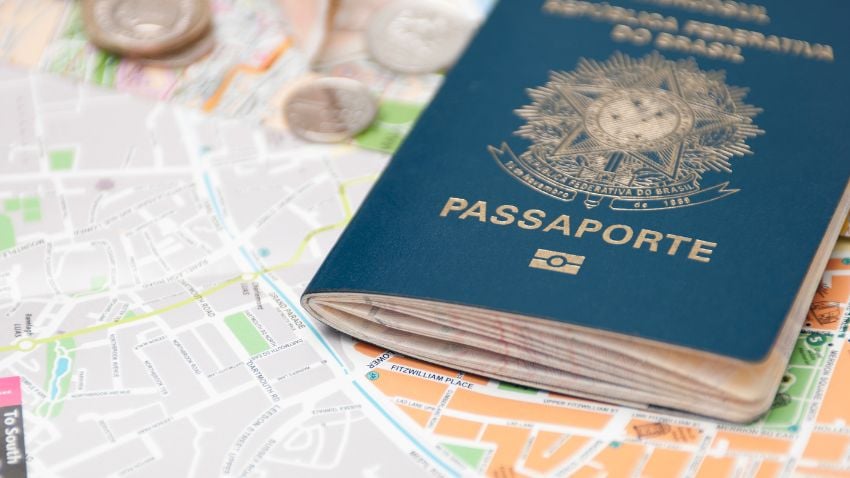Living In South Korea: Pros & Cons You Should Know
South Korea is far more than K-pop and K-dramas. It is a country known for outstanding food, from bustling street markets to high-end dining, as well...

5 min read
Avid readers of Expat Money know we have many articles about acquiring second passports— an essential element of any well-rounded Plan B strategy. But have you ever wondered what governments see when they scan your passport at the border?
Today, we’re exploring this often-overlooked question to uncover the digital depths of your travel document. Each time your passport is scanned, the embedded chip broadcasts specific information to immigration authorities, which is crucial for verifying your identity and ensuring the security of your destination.
But there's more to your passport than your photo and date of birth. We’ll explore the technical details of this process, revealing what data is shared, why it matters, and how it impacts your travels.

Brazilian Passport
When looking at your own passport, you will come across the following pages:
The front cover features the document type, the country's coat of arms, the country of issue's name, and, recently, the biometric symbol for passports with electronic chips;
The title page often contains the name and a sort of disclaimer stating that the document is not transferable and must be used only by the person to whom it was issued. Sometimes, though, it can be on the last page;
The passport data page includes all the important information, such as name, surname, nationality, passport number, etc. This section is often called the Visual Inspection Zone. Below that is the Machine Readable Zone;
The remaining pages are the visa pages, which are blank and used for stamps or visas when travelling abroad.
.jpg?width=850&height=478&name=Identifying%20the%20Machine%20Readable%20Zone%20(MRZ).jpg)
Identifying the Machine Readable Zone (MRZ)
The Machine Readable Zone is the key to international travel not because it is a technological marvel but because it also protects your identity when abroad; in other words, it reduces the risk of passport fraud. Moreover, it facilitates fast processing at borders.
You can easily find all your personal information and the validity of your document by looking at the passport data page. Then, the Machine Readable Zone underneath is meant to prevent document tampering and facilitate the verification process.
So the question is, how do government officials, passport readers and Automated Border Control (ABC) systems obtain your data via the MRZ? Also, how is this information structured? Essentially, it is a two-line string of characters without special signs, but in general, it looks like this:
The first letter signifies the type of document. In the case of regular passports, it is a ‘P.’ Diplomatic, official and emergency passports have different designations, varying from country to country. Other codes are ‘V’ for visas, I for “ID cards,” and ‘T’ for temporary or emergency passports. Each of these reflects the passport’s intended use and privileges;
After a less-than symbol (<), you will find the country code. For example, 'USA' stands for the United States and 'CRI' for Costa Rica;
Then, you will encounter your surname and name, separated by two less-than symbols (<<). Note that if you have two surnames, like in many Latin American countries, or even two names, they will be separated by a single less-than symbol (<). Also, hyphens and apostrophes are omitted for simplicity;
Next, you will find a string of less-than symbols to fill in the gaps;
In the second line, you will encounter the passport number, which typically is nine digits long; then, there’s a check digit;
After that, you will see the country code again, followed by the date of birth in the year-month-day (YYMMDD) format and a check digit;
Following is a letter indicating the sex of the passport holder. 'F' and 'M' respectively stand for female and male;
The six digits afterwards refer to the date of expiry, followed by a check digit;
The rest of the digits are for personal ID numbers or other optional elements, along with a check digit and a composite check digit.
Check digits are calculated through a repetitive weighting of the number 731, which verifies the authenticity of the document’s data. Note that the less-than symbol may be called a “filler character,” and the structure of this string is governed by Doc 9303 from the International Civil Aviation Organization (ICAO).
.jpg?width=850&height=478&name=Scanning%20passport%20(2).jpg)
Cryptography and digital signatures are utilized to safeguard data on RFID chips; essentially, only individuals possessing a secret key can access or modify your information
Radio Frequency Identification chips are tiny yet crucial components of modern-day passports, although they are also used in other forms of identification like driver’s licenses. Have you ever seen the circle inside two bars on the cover of your passport? That symbol represents electronic chips; these devices employ wireless communication via data waves to transmit and store data safely. Specifically, RFID chips store and transmit the holder’s personal information to facilitate identity verification and border control processes.
The information RFID chips store usually include:
Biographical data: This includes the holder’s name, date of birth, nationality and other essential personal information. It is basically a coded version of the information displayed on the Visual Section Zone;
Digital Photograph: This is a digital image of the passport holder’s face, helping with facial recognition to verify their identity;
MRZ information: The chip may also contain MRZ data such as the passport number or the expiration date for quick reference.
Encryption and digital signatures are employed to safeguard the data on RFID chips; simply put, only those with a secret key can access or change your information. Additionally, Basic Access Control (BAC) and Extended Access Control (EAC) are high-end technologies that allow gadgets with the right digital keys to get through. Therefore, your information is protected by layers of digital security.
.jpg?width=850&height=478&name=Scanning%20passport%20(3).jpg)
The Automated Border Control (ABC) system uses hardware and software to check if travel documents are real; it has scanners that read MRZ and RFID chips, getting your info very quickly
Now that you know the two most important elements of a passport, the question is, how do countries scan your passport data? What kind of devices do they use to authenticate your data?
The Automated Border Control (ABC) system uses hardware and software prepared to verify the authenticity of travel documents; these systems are equipped with specialized scanners that read MRZ and RFID chips, extracting your information in mere seconds.
Also, the Optical Character Recognition (OCR) deciphers the MRZ to turn printed characters into digital data that the system can process to verify the document’s validity and flag any discrepancies or anomalies.
At the same time, RFID readers retrieve the stored biographical data and digital photographs contained in the passport chip. Finally, facial recognition technology matches the photo taken by the checkpoint’s camera with the picture on the chip to confirm the holder’s identity.
These technologies make airport checkpoints work faster and more efficiently to ensure identity verification and document authenticity while avoiding delays.

Being mindful of what goes down when governments scan your document, how they go about it, the sort of tech they're using, and the info they're gathering is key so you're not kept in the dark and can make well-informed decisions
Having all these technologies in a passport can indeed streamline your travels, but the cost of this convenience is the massive amount of information that governments around the world gather about you and your family. Even if you have multiple passports, I always emphasize the importance of privacy, especially nowadays, when we have such surveillance technology under the guise of security and efficiency. Your scanned passport and the way you spend your money—depending on the bank you use and where you are—reveal more about you than you may know. However, it's important to clarify that while considerable data can be collected, governments do not have access to private details such as your bank account, tax returns, or other sensitive information through your passport alone, dispelling some common concerns about privacy breaches.
Although we can't change this, since a passport is essential when you seek privacy and are devising your Plan B abroad, being aware of what happens when governments scan your document, how they do it, the type of technology they use, and the kind of information they collect is crucial so that you're not left in the dark and can make informed choices.
Here at Expat Money, we're committed to providing insights that not only inform but also enhance your experiences abroad, ensuring you’re well-prepared for whatever your global journey might entail.
If you want the best intel from the expat world, including profitable offshore opportunities, little-known tax-saving strategies, and hard-won insights on immigration, passports, and Plan-B residencies, all delivered to your inbox every single week, then join our daily correspondence, EMS Pulse®. Currently enjoyed by over 84,000 expats and expat-hopefuls worldwide. Fill in the form below to join our newsletter free:

Written by Mikkel Thorup
Mikkel Thorup is the world’s most sought-after expat consultant. He focuses on helping high-net-worth private clients to legally mitigate tax liabilities, obtain a second residency and citizenship, and assemble a portfolio of foreign investments including international real estate, timber plantations, agricultural land and other hard-money tangible assets. Mikkel is the Founder and CEO at Expat Money®, a private consulting firm started in 2017. He hosts the popular weekly podcast, the Expat Money Show, and wrote the definitive #1-Best Selling book Expat Secrets - How To Pay Zero Taxes, Live Overseas And Make Giant Piles Of Money, and his second book: Expats Guide On Moving To Mexico.

South Korea is far more than K-pop and K-dramas. It is a country known for outstanding food, from bustling street markets to high-end dining, as well...

Asia is one of the most fascinating regions in the world for travel, offering an extraordinary mix of cultures, histories, and landscapes. From...

The presidential elections held in Costa Rica on February 1, 2026, provided another example of the electoral consolidation of right-wing politics in...